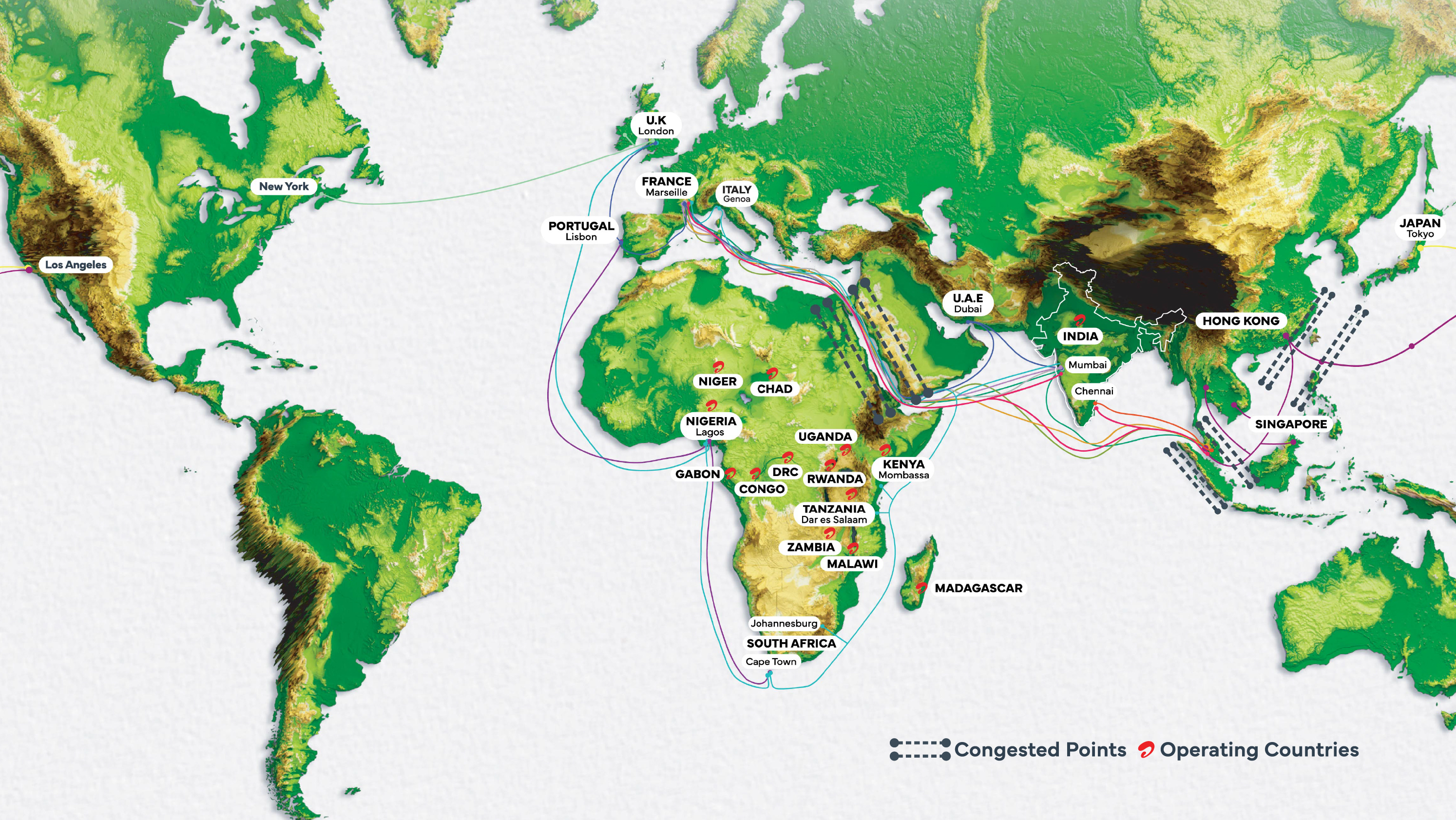Airtel Business Broadband Vs Satellite Internet: Which One is Right for Your Enterprise?
-
May 26, 2025
-
7 min read

Choosing the right internet connection can feel like a background task until it disrupts your business. Whether it’s a dropped video call with a client, a delay in cloud sync, or sluggish internal systems, connectivity gaps affect everything from operations to customer experience. As businesses grow more dependent on digital tools, the foundation they run on becomes more critical.
For many, the choice comes between two paths. The first is Airtel broadband for office, which offers fibre-backed high-speed access with enterprise-grade features. The second one is satellite internet. Let’s see how these two connectivity paths measure up against the expectations of today’s enterprise.
Airtel Business Broadband Vs Satellite Internet | Quick Comparison
Below is a detailed comparison between Airtel broadband for office and satellite internet to help you decide which one would work best for your enterprise.
1. Speed and Bandwidth
Airtel Business Broadband
- Offers a broad range of speeds, starting at 40 Mbps and extending up to 1 Gbps.
- High upload and download speeds support functions such as cloud computing, video conferencing, file sharing, and digital tools.
- Speed is consistent in areas with robust fibre infrastructure. This makes it suitable for simultaneous use by multiple employees or departments.
Satellite Internet
- Speed depends on the provider and equipment but typically ranges between 20 Mbps and 100 Mbps in best-case scenarios.
- Upload speeds are often lower than download speeds, and both can fluctuate with changes in network load or atmospheric conditions.
- Not ideal for bandwidth-intensive environments where high concurrency or frequent large data transfers are standard.
2. Latency and Responsiveness
Airtel Business Broadband
- Fibre-based networks allow for low latency, which means minimal delay in data transmission.
- Suitable for latency-sensitive applications like VOIP calls, cloud-based editing tools, financial transactions, and dashboards.
- Employees working across locations can use collaboration platforms without significant delay or lag.
Satellite Internet
- Latency is inherently higher due to the signal’s travel distance to and from geostationary satellites (approx. 36,000 km).
- Even with stable conditions, delay is typically between 600 to 900 milliseconds, which makes live applications difficult to operate efficiently.
- Communication tools that rely on voice or video become harder to use when latency interferes with natural conversation flow.
3. Installation and Setup
Airtel Business Broadband
- Installation for this office broadband internet is simple.
- No installation fees or hardware deposits are charged to business customers.
- Minimal hardware is required on-site, and setup usually takes a few days from confirmation to activation.
Satellite Internet
- Requires installation of a satellite dish, receiver, and modem, with appropriate elevation and a clear line of sight to the sky.
- Often involves site surveys, building permissions (especially in commercial towers), and longer activation timelines.
- Installation may face environmental restrictions or delays during adverse weather conditions or in highly regulated premises.
4. Network Security and Device Protection
Airtel Business Broadband
- Includes Cisco-powered DNS security, which filters and blocks unsafe or suspicious domains before connections are made.
- Provides Kaspersky-based endpoint protection, helping protect user devices from malware, phishing attempts, and ransomware.
- These security features are integrated into the service. So, you get basic cyber resilience without additional software requirements.
Satellite Internet
- Generally does not come with built-in security systems or antivirus services.
- Businesses must configure their own firewalls, monitoring systems, and endpoint protection tools to safeguard the network.
- Additional security costs and administrative overhead may arise, particularly for small and medium enterprises with limited IT staff.
5. Static IP and Network Control
Airtel Business Broadband
- Offers static IPs, allowing businesses to host internal services, use encrypted remote access, and manage firewalls more effectively.
- Facilitates reliable VPN connections and remote desktop sessions for off-site teams or external consultants.
- Static IPs are important for businesses managing multiple sites or services, including mail servers, surveillance systems, and ERP tools.
Satellite Internet
- Typically provides dynamic IP addresses, which change periodically and are unsuitable for persistent services.
- Static IPs may be available at additional cost through enterprise-level plans, though availability varies by provider.
- Dynamic addressing complicates remote access and increases reliance on third-party solutions like dynamic DNS, which can add technical complexity.
6. Voice Integration and Communication Tools
Airtel Business Broadband
- Comes with built-in landline functionality and supports unlimited voice calls to any network within India.
- Includes features such as parallel ringing, where incoming calls to the landline also ring on a linked mobile device, helping users stay reachable away from desks.
- Eliminates the need for separate telecom contracts or mobile allowances for desk-based communication.
- When used alongside Airtel corporate postpaid plans it supports better mobility and continuity across team
Satellite Internet
- Does not include landline voice integration as part of the service.
- Businesses rely on internet-based calling applications (e.g., Skype, Zoom, WhatsApp), which may suffer from voice delay or distortion.
- Voice reliability varies with signal quality and latency, especially during group meetings or customer interactions.
7. Pricing Structure and Commercial Terms
Airtel Business Broadband
- Business plans start at affordable prices per month and scale up with higher speeds and service tiers.
- No installation charges or upfront hardware deposits apply.
- Businesses are eligible to claim GST credit, improving the effective cost over time.
- Pricing remains fixed regardless of data volume, which supports predictable budgeting.
Satellite Internet
- Initial costs are usually higher due to equipment purchase or rental, including satellite dishes and modems.
- Service charges may depend on usage (e.g., GBs consumed), speed tiers, or even weather guarantees.
- Some providers enforce data caps or throttle speeds after certain usage thresholds.
- Long-term cost predictability can vary, particularly in high-traffic or multi-branch environments.
8. Geographic Reach and Deployment Suitability
Airtel Business Broadband
- Best suited for urban and semi-urban areas where fibre infrastructure is already laid.
- Works well for offices, retail outlets, shared working spaces, and multi-floor buildings.
- Installation and servicing depend on proximity to the network backbone, which covers most major Indian cities and towns.
Satellite Internet
- Designed to operate in places with clear sky visibility, including remote, rural, or geographically isolated locations.
- Suitable for industries operating in field conditions, such as mining, infrastructure, agriculture, and emergency relief.
- Does not require ground cabling or terrestrial access.
Which One Should Your Enterprise Choose?
Your choice depends primarily on where you operate and how your business uses the internet.
Choose Airtel broadband for office if:
- Your office lies within a fibre coverage area
- You depend on cloud platforms, video calls, and online systems
- You want inbuilt security, voice integration, and professional support
- You require features like static IP, unlimited calls, and device-level protection
Choose Satellite Internet only if:
- Your business operates in remote or geographically inaccessible areas
- Fibre broadband is not physically available
- You need short-term or backup connectivity at temporary locations
Airtel’s Office Internet solution supports digital business functions reliably. With bandwidth options up to 1 Gbps, static IP, and built-in cybersecurity, it is the backbone of modern office connectivity.
The Key Takeaway
Both satellite internet and Airtel broadband for office serve specific business contexts. Satellite solutions help connect locations beyond physical infrastructure, but come with trade-offs in consistency, latency, and control. Airtel’s broadband, by contrast, brings together speed, enterprise-level features, and integration flexibility, particularly well-suited to offices operating in connected environments.
For enterprises prioritising performance, network control, and long-term scalability, the capabilities offered through Airtel’s fibre-backed service present a reliable foundation. However, the final choice depends on where you operate and what you expect your network to support, not just today, but as your business evolves.
 Share
Share









